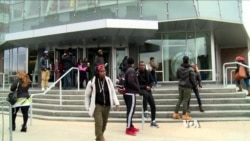A new report says black and white Americans continue to be divided in areas of economic opportunity, education, health and social justice.
The National Urban League recently released its yearly report, called “The State of Black America.” The league works to help black Americans. Its report tells a familiar story of racial disparities in American life.
It says blacks are much more likely to be unemployed than whites. It notes that as many as 20 percent of blacks in seven of the country’s largest cities do not have a job.
The study links education and joblessness.
Mark Morial is the president of the National Urban League. He notes there is a large difference in the proficiency of blacks and whites in mathematics and reading. He says that means the inequality between blacks and whites will continue.
“The United States must close the gaps, must close the achievement gap, must close the jobs gap. It is essential to America’s economic competitiveness in the 21st century.”
Mr. Morial says the group’s report showed that even when blacks and whites have the same educational level, black unemployment is higher.
“People ask me why and I think it is the presence of still exclusion and discrimination in the workforce to some extent.”
Rudy Crew is president of Medgar Evers College in Brooklyn, New York. About 90 percent of the students there are black. He says the school is taking steps to make sure they are ready for the workplace.
“More and more we’re having everything from career days to a real focus on the networking, if you will, that it takes to basically not just to enter your chosen career but to really get the job that you want.”
Shemroy Primo is in his final year at the college. He says he was disappointed but not surprised by the report.
“But I mean as a black man, you know it’s really hard out there in the job market. And I went to high school in Brooklyn, East New York, so I have a lot of friends that are really looking up to me and they’re really proud of me because you know I’ve taken a different route. I went to college. I'm a senior. I'm a rising senior. This is my last semester and I plan to go to Law school”
Mr. Primo believes he must work twice as hard as a young white man to get a job.
I’m Marsha James.
Daniela Schrier reported this story from New York. Marsha James wrote it for VOA Learning English. Christopher Jones-Cruise was the editor.
_____________________________________________________________
Words in This Story
state – n. the things that affect the way something is or happens; the characteristics of a situation
familiar – adj. frequently seen, heard or experienced
disparity – n. a noticeable and often unfair difference between people or things
proficiency – n. a high degree of competence, skill or expertise
gap – n. a difference between two people, groups or things
achievement – n. something that has been done or achieved through effort; a result of hard work
essential – adj. extremely important and necessary
exclude – v. to prevent someone from doing something or being a part of a group; exclusion - n
discrimination – n. the practice of unfairly treating a person or group of people differently from other people or groups of people
Is there discrimination in your country? If so, how is it practiced and who does it affect? We want to hear from you. Write your thoughts in the comments section.





